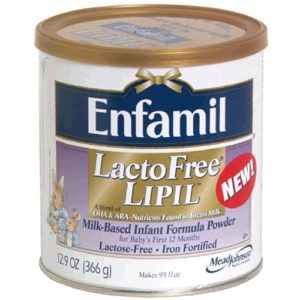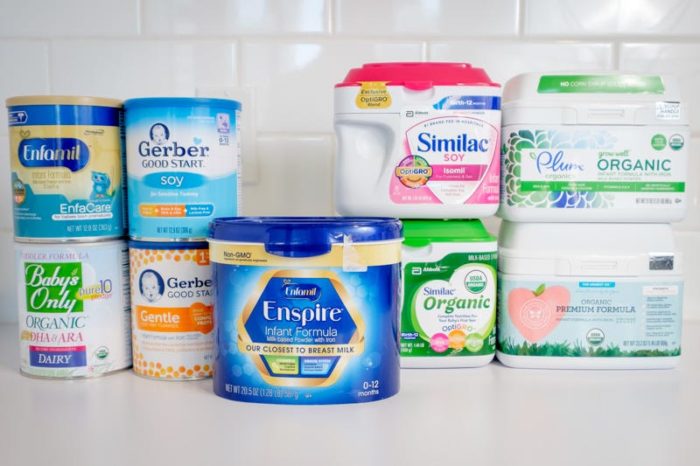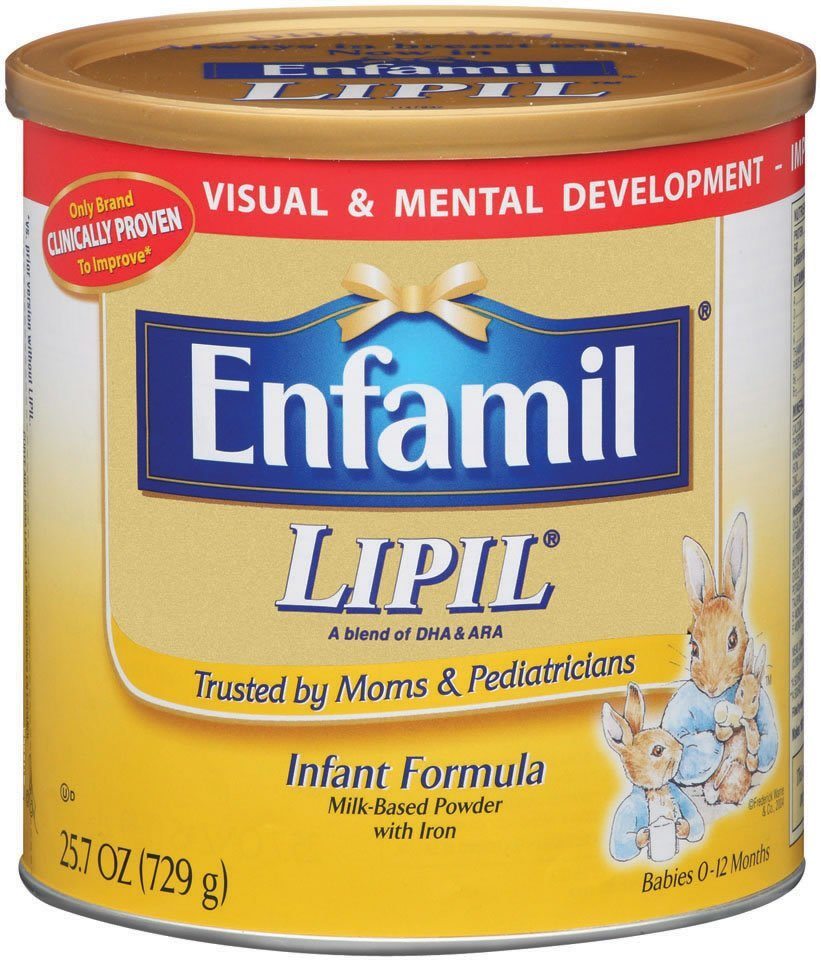Iron, a vital nutrient for the growth and development of infants, cannot be underestimated. Low iron levels can lead to anemia and cause developmental delays along with other health issues. It’s no wonder that infant formula is often fortified with this crucial mineral.

But what about those babies who need baby formula with low iron due to medical conditions or digestive problems? This question can leave new parents feeling overwhelmed when it comes to choosing the right formula for their little one.
Although options for lower iron formulas are available, it is imperative to consult your pediatrician before making any changes from an iron-fortified infant formula. Your doctor will help you determine whether your child requires low-iron baby formula based on their specific needs.
In essence, comprehending the significance of appropriate nutrition in infancy plays a significant role in healthy growth and development. While many infant formulas include added iron, some infants may require varying levels due to medical reasons or digestion complications. Before selecting any kind of baby formula for your newborn, always seek consultation from your pediatrician first!
Low-Iron Formula: Which is Best for Your Baby?
The perplexing task of choosing the ideal baby formula for your precious bundle of joy can leave you with countless questions and concerns. One crucial factor to consider is the iron content, as insufficient levels could lead to developmental setbacks and various health issues in infants. However, some medical conditions or allergies may require a low-iron alternative.

Should your pediatrician recommend a reduced-iron formula or if you suspect that your little one struggles with high-iron options, rest assured that there are several alternatives available. Soy-based formulas come highly recommended for babies who cannot tolerate milk-based options due to lactose intolerance or milk allergy. Additionally, hydrolyzed protein formulas cater to infants experiencing digestive distress.
Although low-iron formulas may prove necessary in specific cases, most babies benefit from added nutrients provided by iron-fortified products. Should you decide on a milk-based infant formula with lower iron levels than usual, ensure optimal dietary sources through solid foods and/or supplements advised by your healthcare provider.
Keep in mind that each infant possesses unique requirements evaluated on an individual basis by their healthcare professional. Fortunately, same-day delivery service ensures hassle-free doorstep delivery of suitable products – making this bewildering process just a tad bit easier!
Choosing the Right Infant Formula: Factors to Consider Beyond Iron Content
The complexities of selecting the proper infant formula for your little one force you to delve deeper than just iron content. One curious factor that may come into play is if your baby has an intolerance or allergy towards lactose, which can be found in milk-based formulas. In these instances, a soy formula could potentially provide more solace. However, it must be noted that medical professionals should oversee any use of soy formulas.
Another puzzle piece to consider when determining the right course of action is whether you plan on breastfeeding alongside bottle feeding. Breast milk naturally contains iron and aids in warding off iron deficiency anemia in infants. If breast milk will serve as a part-time option, consulting with your pediatrician about supplementing additional iron stands as a wise decision.
A further quandary to ponder over revolves around potential constipation issues stemming from certain types of infant formulas. Low-iron formulas or specific milk-based options can lead some babies down this uncomfortable path. Should this issue arise with your bundle of joy, seeking advice from medical experts about alternative choices such as partially hydrolyzed protein or amino acid-based formulas could offer relief.
Bear in mind that each and every child comes equipped with their own unique set of necessities and preferences; therefore what works wonders for one baby might not have the same effect on another wee one. Relying upon guidance from healthcare providers while also following recommendations put forth by esteemed organizations like the American Academy of Pediatrics should remain at the forefront when tackling decisions regarding infant nutrition and feeding practices.\n
Exploring Low-Iron Formula Options: Similac, Alimentum, Elecare, and More
The perplexity of choosing a baby formula can leave parents feeling overwhelmed. The burstiness of information regarding the amount of iron in infant formula has left many questioning what to do next. Low iron formulas are available for infants who need lower levels or have trouble tolerating higher amounts, but some lactose-free options also contain less iron.
While powdered infant formula is an affordable and easy-to-store solution, it’s important to note that not all powders contain enough iron to meet your little one’s needs. It’s crucial for parents to consult with their pediatrician about whether an additional supplement is required.
Interestingly, breast milk itself isn’t high in iron; however, breastfed babies typically receive adequate nutrition from other sources like prenatal stores and solid foods after six months old. If breastfeeding isn’t possible, opting for a milk-based or soy-based formula with added iron may be necessary to ensure your baby receives the essential nutrients they require.
The Benefits of Breastfeeding and Iron Supplementation for Infants
The nourishment of a newborn is a perplexing matter, yet breastfeeding has been deemed the most superior method for providing all the necessary nutrients to an infant, including iron. The form of iron present in breast milk is highly absorbable by the baby’s body and aids in proper brain development. However, some infants may require additional iron supplementation if they are born prematurely or have low birth weight.
Iron fortification has long been practiced with infant formula to ensure that growing babies get their fill of this vital nutrient. Nevertheless, cow’s milk-based formulas carry risks for certain infants who may encounter adverse reactions or experience digestive difficulties due to lactose intolerance.
Fear not! Parents can choose soy-based formulas like 2’-FL HMO Prebiotic which offer ample nutrition while being gentle on the baby’s sensitive digestive system. Furthermore, alternative options such as Alimentum and Elecare provide cow’s milk protein-free formulas with added iron content suitable for infants who cannot tolerate traditional cow’s milk-based formulae.
Overcoming Common Challenges: Constipation, Milk Allergies, and More with Low-Iron Formula
The perplexing and bursty challenges of constipation and milk allergies plague parents when it comes to feeding their little ones. But fear not, for the market offers low-iron formulas that can mitigate these issues. However, don’t be fooled by iron content alone – artificial growth hormones and cow-milk origins should also be considered.
Iron-deficiency anemia poses a grave threat to infants aged 0-12 months old, according to the American Academy of Pediatrics (AAP). To avoid this danger, ensure that your baby gets enough iron through either breastmilk or formula. If your infant is exhibiting symptoms related to constipation or milk allergies such as fussiness, try switching them over to a gentle low-iron formula that contains all necessary nutrients.
Keep in mind that preemies may require different nutritional needs than full-term babies and ought to undergo evaluation by healthcare providers prior to making any formula changes. Additionally, not all low-iron formulas are suitable for all babies with milk allergies – consulting with pediatricians can provide clarity on the best path forward. With countless online options now offering same-day delivery services, selecting the ideal low-iron formula has never been more accessible!
Expert Advice: What Your Pediatrician Wants You to Know About Infant Formula and Iron
The conundrum of feeding newborns is a perplexing dilemma that leaves many parents in a state of bewilderment. Pediatricians, the wise and knowledgeable beings that they are, advocate for breast milk as the ultimate source of nutrition for infants during their first six months of life. Breast milk is replete with all the essential vitamins and minerals required to nourish human growth and development such as iron.
However, if breastfeeding isn’t an option, parents must select formulas that replicate breast milk as closely as possible. Iron-fortified formulas are infused with additional iron to combat any deficiencies in babies. Nonetheless, certain medical conditions such as preterm birth or an allergy to cow’s milk might necessitate low-iron formulations which are hydrolyzed and easier on digestion than typical dairy-based products.
But wait! Before jumping onto this bandwagon choice of low-iron formulas, it’s important to note that prolonged usage without physician monitoring may lead to lower red blood cell counts beyond one year of age. It’s always paramount for parents to consult with their pediatrician before making any modifications related to their baby’s formula or dietary choices.
Finally yet importantly – here comes FDA regulations into play; infant formulas must abide by specific nutrient contents and safety standards established by regulatory authorities including being non-GMO (not genetically modified).
The Future of Infant Formula: New Innovations, Trends, and Research on Iron Supplementation.
As research forges ahead, the horizon of infant formula appears to be brimming with promise. In the United States, formulas are scrupulously created and regulated by the Food and Drug Administration (FDA) to ensure they meet specific nutrient requirements for infants. Yet recent studies have unearthed a perplexing discovery – human milk oligosaccharides (HMOs), found exclusively in breast milk, play an indispensable role in bolstering an infant’s immune system and gut health. Burstiness abounds as some companies scramble to incorporate HMOs into their formulas.
Moreover, hypoallergenic formulas may burgeon in popularity as food allergies continue to soar among older children. These specialized formulations cater to infants who are at risk of developing allergies or intolerances and can circumvent allergic reactions altogether. However, caution is paramount here – consult with your pediatrician before switching over.
Experts herald introducing solid foods around six months of life while continuing either breastfeeding or formula feeding – this transition is crucial for brain development and provides essential nutrients that might not be present in breast milk or formula alone.
In conclusion: although there are myriad types of formulas on the market today, it’s always wise to exercise abundant caution by consulting with your pediatrician before making any changes to your baby’s diet. With ongoing research and technological advancements on the horizon, we can expect even more innovative options that will support optimal growth and development for all babies – whether fully breastfed or formula-fed!

